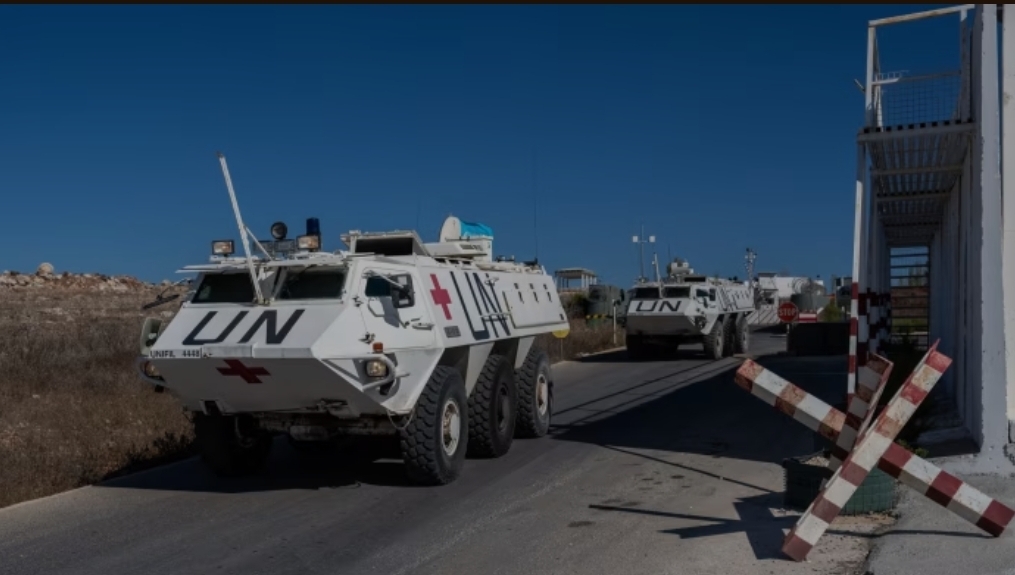Irish president rejects Israeli calls for UN battalion to withdraw from southern Lebanon
Financial Times

Ireland has rejected Israeli calls for its UN peacekeeping troops to withdraw from Lebanon, insisting it will not evacuate them even as Israel intensified its air campaign against the militant group Hezbollah.
Irish President Michael D Higgins slammed what he called “outrageous” threats against the peacekeepers from the Israel Defense Forces that “sought to have them evacuate the villages that they are defending”. His intervention came days before Ireland’s premier was due to visit the White House.
Ireland has 347 peacekeeping troops stationed in southern Lebanon as part of a joint battalion with Polish soldiers. Two of the 25 outposts on the Blue Line in effect dividing Lebanon from Israel and the Golan Heights are under Irish command.
Higgins said Israel had demanded the entire UNIFIL peacekeeping mission in Lebanon “walk away” from the conflict.
James Browne, a junior Irish justice minister, said on Sunday Irish troops were “in real harm’s way” and the president had been right to speak out.
“The UN has made it clear they won’t abide the request from the IDF to withdraw,” Browne told broadcaster RTÉ.
“We are committed to the mission,” said Captain Kevin Kenny, a spokesperson for Ireland’s Defence Forces.
Israel continued to pound Lebanon with a fierce wave of air strikes overnight, making it the heaviest 24 hours of bombing since it stepped up its campaign against Hezbollah at the end of last month.
The Irish Taoiseach Simon Harris is expected to discuss the widening conflict with Joe Biden when he meets the US president in Washington this week to mark the centenary of US-Irish diplomatic relations.
UNIFIL spokesperson Andrea Tenenti said Israel notified its intention to launch ground operations in Lebanon on September 30 and “requested we relocate from some of our positions”.
“Peacekeepers remain in all positions and the UN flag continues to fly,” he said.
A spokesperson for Israel’s military said the IDF was in communication with UNIFIL so they are “not part of this conflict” and are given warnings to make sure “they are not in harm’s way when there are clashes with Hezbollah”.
Irish troops have been serving as peacekeepers in Lebanon since 1978 and government and military officials insist morale among Irish troops is good. Capt Kenny said Irish troops had not come under fire directly but “on occasion, and when appropriate, they take cover in protective installations [bunkers]”.
“We view our presence there as essential. We are the eyes and ears of the international community. Our aim is to provide the space for diplomacy to happen and the delivery of humanitarian aid as necessary,” he added.
Higgins, in his statement on Saturday, called Israel’s demand that Irish peacekeepers leave “an insult” both to the UN and to the soldiers risking their lives.
An Irish peacekeeper, Private Seán Rooney, was killed in an attack on a convoy in Lebanon in December 2022.
Declan Power, a security analyst and former Irish peacekeeper in Lebanon in the 1990s, said Austria had withdrawn peacekeeping forces from the Israeli-Syrian border in 2013.
If any troops were withdrawn this time, he said, “somebody would have to come in and fill the gap”. “But when people talk about evacuations, the safest place to stay is in situ unless you’re a direct target . . . which the UNIFIL contingent would not be,” Power said.
He described Higgins’ intervention “at best as unhelpful”, saying the troops’ important liaison work on the ground was better served “by people on the sidelines . . . not getting in the way”.
